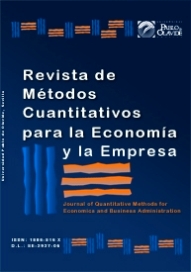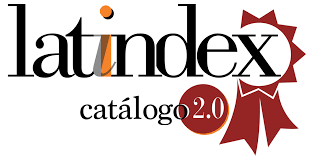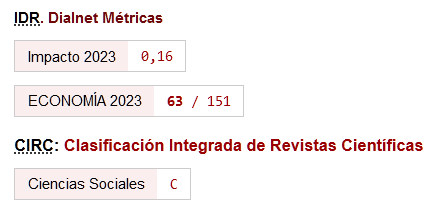Moderating Influence of Idiosyncratic Diversity on the Relationship between Accounting Ethics and Financial Reporting Quality
DOI:
https://doi.org/10.46661/rev.metodoscuant.econ.empresa.7107Keywords:
idiosyncratic diversity, financial reporting quality, accounting ethics, integrity, professional behaviourAbstract
Purpose- The study investigates the moderating influence of idiosyncratic diversity on the relationship between accounting ethics and financial reporting quality, against the backdrop of the unending corporate collapses and their antecedent effect on the profession of accounting.
Design/Methodology/Approach- The study is anchored on the positivist philosophy with a deductive research strategy. We employed theoretical triangulation having combined agency theory and resource dependency theory. The sample size of three hundred and eighty-four respondents was established using the Cochran (1977) approach for the infinite population. Primary data were collected for the study through a survey approach and analysed using the Ordinary Least Squares regression technique.
Findings- The study validates the significant relationship between accounting ethics and financial reporting quality in extant literature. In addition, we found a significant moderating influence of idiosyncratic diversity on the relationship between accounting ethics and financial reporting quality.
Practical implications- The study demonstrates the strategic importance of accountants of diverse nationalities in delivering quality financial reporting in Nigeria.
Research limitations/implication- The research is a country-wide study of accountants in Nigeria which enhances the extensive generalization of the outcomes.
Originality/value- While extant studies have mainly been preoccupied with the accounting ethics-financial reporting dynamics, the current study focuses on understanding the moderating influence of idiosyncratic diversity on the relationship between accounting ethics and financial reporting quality. In addition, the country-wide approach adopted circumvented the limitation of micro numerosity of data which has been the bane of major prior studies.
Downloads
References
Abbott, L.J., Daugherty, B., Parker, S., & Peters, G.F. (2016). Internal audit quality and financial reporting quality: The joint importance of independence and competence. Journal of Accounting Research, 54(1), 3-40.https://doi.org/10.1111/1475-679X.12099
Afiah, N.N., & Rahmatika, D.N. (2014). Factors influencing the quality of financial reporting and its implication on Good Corporate Governance (Research on local government in Indonesia). International Journal of Business, Economics, and Law, 5(1), 111-121.
Aifuwa, H.O., Embele, K., & Saidu, M. (2018). Ethical accounting practices and financial reporting quality. EPRA International Journal of Multidisciplinary Research. 4 (12), 31-44.
Aluwi, N.A.M., Nasir, N.A.M., Hashim, H.A., Muhammad, M.Z., Nawi, N.C., & Yusoff, M.N.H. (2023). Corporate ethics and financial reporting quality: A thematic analysis from Accountants' perspectives. In: Mansour, N., Bujosa Vadell, L.M. (eds) Finance, Accounting and Law in the Digital Age. Contributions to Management Science. Springer, Cham. https://doi.org/10.1007/978-3-031-27296-7_8
Airaksinen, T. (nd). Institutional issues involving ethics and justice https://www.eolss.net.
Alfiero, S., Cane, M., Doronzo, R., & Esposito, A. (2018). The effect of national cultural differences of board members on integrated reporting. Corporate Board: Role, Duties & Composition,14(1), 7-21.https://doi.org/10.22495/cbv14i1art1
Amisi, O. (2019). Accounting ethical practices and financial reporting quality of manufacturing companies in Uganda, a case study of Mukwano group of companies. [Unpublished Dissertation] submitted to the College of Economics and Management, Kampala International, University.
Bakhtiari, M. & Azimifar, M. (2013). Impact of professional ethics on financial reporting quality. Advances in Environmental Biology, 7(10), 2862-2866
Blanchard, O.J. (1998). Comments. Journal of Business and Economic Statistics, 5(1967):190.
Botosah, C.A. (2004). Discussion on a framework for the analysis of Firm risk communication. The International Journal of Accounting, 39(3):289-295.https://doi.org/10.1016/j.intacc.2004.06.007
Braam, G. & Beest, F.V. (2013). Conceptually-based financial reporting quality assessment: An empirical analysis on quality differences between UK annual reports and US 10-K reports. NiCE Working Paper 13-106. (6) (PDF) IFRS Adoption and Financial Reporting Quality: IASB Qualitative Characteristics Approach. Available from: https://www.researchgate.net/publication/329012123_IFRS_Adoption_and_Financial_Reporting_Quality_IASB_Qualitative_Characteristics_Approach [accessed Sep 06 2021].
Byars, S.M., & Stanberry, K. (2018). Business Ethics. Houston: Rice University.
Callao, S., Jarne, J.I., & Wroblewski, D. (2017). Detecting earnings management investigation on different models measuring earnings management for emerging Eastern Europe countries. International Journal of Research. 5(11):222-259.https://doi.org/10.29121/granthaalayah.v5.i11.2017.2351
Companies and Allied Matters Act .(2020). Federal Government of Nigeria Printers, Abuja.
Carter, S. L. (1996). Integrity. New York: HarperCollins.
Chartered Financial Analyst Institute (2020). Financial reporting quality. cfa institute.org.
Cochran, W. G. (1977). Sampling techniques, Third Edition, New York: John Wiley & Sons.
Choi, T.H. & Pae, J. (2011). Business ethics and financial reporting quality: Evidence from Korea. Journal of Business Ethics, 103, 403-427.
https://doi.org/10.1007/s10551-011-0871-4
Cox. T. (2001). Creating the multicultural organization. A strategy for capturing the diversity. San Fransisco, USA: Jossey-Bass.
Cox, T.H.J. (1994). Cultural diversity in organisations: Theory research and practice. San Fransisco:Berret-Koehler.
Chung, B.H. (2017). Do differences in national cultures affect cross-country financial statement comparability under IFRS? PhD (Doctor of Philosophy) thesis, University of Iowa.
Cruess, S.R., Johnson, S., & Cruess, R.L. (2014). Profession: A working definition for medical education. Teaching and Learning Medicine: An International Journal, 16(1), 74-76.https://doi.org/10.1207/s15328015tlm1601_15
Dalton, D. R., Hitt, M. A., Certo, S. T., & Dalton, C. M. (2007). Agency theory and its mitigation. In A. Brief, & J. Walsh (Eds.), Academy of Management Annals,1: 1-64. Mahwah, NJ: Lawrence Erlbaum. Dalthttps://doi.org/10.5465/078559806
DeAngelo, L. E. (1986). Accounting numbers as market valuation substitutes: A study of management buyouts of public stockholders. The Accounting Review, 61(3), 400-420.
Dawson, S.L., & Reisch, J.I. (2016). The objectivity of the accountant's judgement: A replication and extension. Https:// the schorlashipecu.edu.
Debbie, J., Dupuis,1., & Maria-Pia, V-Feser. (2013). Robust VIF regression with application to variable Selection in large data sets. The Annals of Applied Statistics, 7,319-341.https://doi.org/10.1214/12-AOAS584
Dechow, P., Sloan, R., & Sweeney, A. (1995). Detecting earnings management. The Accounting Review, 70(2), 193-225.
Defond, M.L., & Jiambalvo, J. (1994). Debt covenant violation and manipulation of accruals. Journal of Accounting and Economics, 17(1-2), 145-176.https://doi.org/10.1016/0165-4101(94)90008-6
Denziana, A. (2015). The effect of audit committee quality and internal auditor objectivity on the prevention of fraudulent financial reporting and the impact on financial reporting quality (a survey on state-owned companies in Indonesia). International Journal of Monetary Economics and Finance, 8(2), 213-227.https://doi.org/10.1504/IJMEF.2015.070784
Donaldson, L., & Davis, J.H. (1989) CEO governance and shareholder returns: Agency theory or stewardship theory. Paper Presented at the Annual Meeting of the Academy of Management.
Edi, E., & Enzelin, I. (2022). Analysing the effect of accounting ethics towards the effect of financial reports. Journal of Accounting, Finance and Auditing Studies, 8(2), 36-53.https://doi.org/10.32602/jafas.2022.009
Eginiwin, J.E. & Dike, J.W. (2014). Accounting ethics and the quality of financial reporting: A survey of some selected oil exploration and producing companies in Nigeria. IOSR Journal of Business and Management, 16(7), 26-36.
https://doi.org/10.9790/487X-16732636
Enofe, A.O., Edemenya, C.C., & Osunbor, E.O. (2015). The effect of accounting ethics on the quality of financial reports of Nigerian firms. Research Journal of Finance and Accounting, 6(12), 123-130.
Enyi, P.E., Adegbie, F.F., Salawu, R.O., & Odesanya, O.S. (2019). Ethical issues and faithful representation of financial reports of quoted companies in Nigeria. International Journal of Business and Management Review, 7(3):1-10.
Florah, O.M. (2018). Safeguarding of integrity in financial reporting and performance of public TVET institutions in Nyanza region, Kenya. International Journal of Advanced Research, 6(8), 768-773.https://doi.org/10.21474/IJAR01/7577
Flood, R., & Roman, N.R.A. (1996). Diversity management: Tripple-loop learning. Chichester: Willey.
Furiady, O. & Kumia, R. (2015). The effect of work experiences, competency, motivation, accountability, and objectivity towards audit quality. Social and Behavioral Sciences, 211, 328-335.https://doi.org/10.1016/j.sbspro.2015.11.042
Gamayuni, R.R. (2018). The effect of internal auditor competence and objectivity, and management support on the effectiveness of internal audit function and financial reporting quality implications at local government. International Journal of Economic Policy in Emerging Economies, 11(3), 248-261.https://doi.org/10.1504/IJEPEE.2018.093951
Habib, A. & Bhuiyan, M.B.U. (2015). Problem directors on the audit committee and financial reporting quality. Accounting and Business Research. 46(2): 121-144. https://doi.org/10.1080/00014788.2015.1039477
Hambrick, D. C., Davison, S.C., Snell, S.A., & Snow, C.C. (1998). When groups consist of multiple nationalities: Towards a new understanding of the implications. Organization Studies 19(2), 181-205. https://doi.org/10.1177/017084069801900202
Hashim, H.A. (2012). The influence of culture on financial reporting quality in Malaysia. Asian Social Science, 8(13), 192-200.https://doi.org/10.5539/ass.v8n13p192
Healy, P. (1985). The effect of bonus schemes on accounting decisions. Journal of Accounting and Economics, 7, 85-107.https://doi.org/10.1016/0165-4101(85)90029-1
Heese, J., Cavazos, G.P., & Peter, C.D. (2023). Can integrity pledges reduce financial reporting? The CLS Blue Sky Blog-https//www.dbluesky-law.columbia.edu
Hoang, T.C., Abeysekera, I., & Ma, S. (2015). The effect of board diversity on earnings quality: An Empirical Study of Listed Firms in Vietnam. Australian Accounting Review, 27(2), 220-232.https://doi.org/10.1111/auar.12128
Herath, S.K., & Albarqi, N. (2017). Financial reporting quality: A literature review. International Journal of Business, Management and Commerce, 2(2), 1-15.
Institute of Chartered Accountants of Nigeria. (1998). (Dimensions of ethics). Lagos, Nigeria.
International Ethics Standards Board for Accountants. (2019). (Dimensions of ethics). New York City, United States of America.
International Federation of Accountants Committee. (2006). (Code of ethics). New York City, United States of America.
Idor, R.M., Odumusor, C.J., & Isek, F.C. (2020). Empirical examination of accounting professional etiquettes and quality of financial statements disclosure. IOSR Journal of Economics and Finance, 11(2), 1-10.
Ibhadode, O.J. (2021). Accounting ethics, diversity management and financial reporting quality [Unpublished doctoral dissertation]. Department of Accounting, Faculty of Management Sciences, University of Benin, Benin City, Nigeria.
Im, C. & Nam, G. (2019). Does ethical behavior of management influence financial reporting quality? Sustainability, 11(5765), 1-16.
https://doi.org/10.3390/su11205765
Jensen, M.C., & Meckling,W.H. (1976). Theory of the firm: managerial behavior, agency costs, and ownership structure. Journal of Financial Economics, 3, 305-360.https://doi.org/10.1016/0304-405X(76)90026-X
Johnson, J. L., Ellstrand, A. E., & Daily, C. M. 1996. Boards of directors: A review and research agenda. Journal of Management, 22: 409-438.https://doi.org/10.1177/014920639602200303
Jones, J. (1991). Earnings management during import relief investigation, Journal of Accounting Research, 29(2), 193-228.
https://doi.org/10.2307/2491047
Kiradoo, G. (2020). Ethics in accounting: Analysis of current financial factors and roles of accountants. International Journal of Management, 11(2), 241-247.
Karasioglu, F., & Humta, H. (2022). Investigation of accounting ethics effect on financial reporting quality and decision-making. Evidence from Kabul-based logistic corporations. International Journal of Management Accounting and Economics, 8(3), 21.
Kertarajasa, A.Y., Marwa, T., & Wahyudi, T. (2019). The effect of competence, experience, independence, due professional care, and auditor integrity on audit quality with auditor ethics as a moderating variable. Journal of Accounting, Finance and Auditing Studies, 5(1), 80-99https://doi.org/10.32602/jafas.2019.4
Kukutia, D.P. (2019). Effects of ethical accounting practices on financial reporting quality: A survey of listed firms in Kenya. Masters of Business Administration Thesis, Kabara University, KABU Repository,http://10.1.130.140:8080/xmlui/handle/123456789/270.
Kusnadi, Y., Leong, K.S., Suwardy, T., & Wang, J. (2015). Audit committees and financial reporting quality in Singapore. Journal of Business Ethics. 139, 197-214. https://doi.org/10.1007/s10551-015-2679-0
Labelle, R., Gargouri, R.M., & Francoeur, C. (2010). Ethics, diversity management, and financial reporting quality. Journal of Business Ethics, 93, 335-353.https://doi.org/10.1007/s10551-009-0225-7
Lainez, J.A. & Callao, S. (2000). The effect of accounting diversity on international financial analysis: Empirical evidence. The International Journal of Accounting, 35(1), 65-83.https://doi.org/10.1016/S0020-7063(99)00030-8
Mabil, A.N. (2019). Investigating effects of accounting ethics on quality of financial reporting of an organization: Case of selected commercial Banks in South Sudan. Mediterranean Journal of Social Sciences, 10(1), 177-191.
https://doi.org/10.2478/mjss-2019-0016
Mahdavikhou, M. & Khotanlou, M. (2011). The impact of professional ethics on financial reporting quality. Australian Journal of Basic and Applied Sciences, 5(11), 2092-2096.https://doi.org/10.2139/ssrn.2092579
Meyer, J., & Rowan, B. (1977). Institutionalized organizations: Formal structure as myth and ceremony. American Journal of Sociology, 83, 340-363.https://doi.org/10.1086/226550
Moridu, I. (2023). Impact of financial statement quality on investment decision making. The ES Accounting and Finance, 1(03), 169-175.
https://doi.org/10.58812/esaf.v1i03.109
Mubaraq, S., Abdulrasaq, M., & Saidu, M. (2019). Ethical accounting practices and financial reporting quality: Evidence from listed firms in Nigeria. Accounting and Taxation Review, 3(2), 97-110.
Musa, B.K. (2019). Professionalism and ethics of accounting in financial reporting: An overview of Nigerian scenario. European Scientific Journal, 15(25), 224-238.https://doi.org/10.19044/esj.2019.v15n25p224
Mustapha, M. (2018). Professionalism, staff competency and financial reporting quality in the public sector. Malaysian Management Journal, 22, 67-86.https://doi.org/10.32890/mmj.22.2018.9672
Omoro, N. (2020). Top management team diversity and the moderating effect of discretionary accounting choices on financial reporting quality among commercial state corporations in Kenya. Journal of Accounting Business and Finance Research, 8(2), 79-89.https://doi.org/10.20448/2002.82.79.89
Ozbilgin, M., Tatli, A., Ipek, G., & Sameer, M. (2014). The business case for diversity management iumv.esrc.acc.uk.
Peasnell, K.V., Pope, P.F., & Young, S. (2000). Detecting earnings management using cross-sectional accrual models. Accounting and Business Research, 30(4), 313-326.https://doi.org/10.1080/00014788.2000.9728949
Pfeffer, J., & Salancik, G.R. (1978). The external control of organisations: A resource dependence perspective. New York: Harper & Row.
Schumann, F., Thus, T.W., Dauth, T., & Zulch, H. (2023). Does top management team diversity affect accounting quality? Empirical evidence from Germany.Journal of Management and Governance, 27(3), 1-39. https://doi.org/10.1007/s10997-23-09668-7
Pfeffer, J., & Salancik, G. R. 1978. The external control of organizations: A resource dependence perspective. New York: Harper & Row
Setiyawati, H. (2013). The effect of internal accountants' competence, managers' commitment to organizations and the implementation of the internal control system on the quality of financial reporting. International Journal of Business and Management Invention, 2(11), 19-27.
Setiyawati, H. & Iskandar, D. (2020). Importance of internal accountants' competence in shaping good quality financial reporting in Local Governments in Indonesia. International Journal of Innovation, Creativity and Change, 11(1), 20-37.
Sheppard, C.R. (1964). Small groups. San Francisco, USA: Chandler Publishing Co.
Tung, R.L. (1993). Managing cross-national and intra-national diversity. Human Resource Management, 32(4), 461-477.https://doi.org/10.1002/hrm.3930320404
United States Agency for International Development [USAID] (2018). Workplace diversity management. Local Enterprise Support Project.
Published
How to Cite
Issue
Section
License
Copyright (c) 2023 Ofuan James ILABOYA, Oscar Chijioke Mgbame, Okhae James Ibhadode, Godwin Ohiokha

This work is licensed under a Creative Commons Attribution-ShareAlike 4.0 International License.
Submission of manuscripts implies that the work described has not been published before (except in the form of an abstract or as part of thesis), that it is not under consideration for publication elsewhere and that, in case of acceptance, the authors agree to automatic transfer of the copyright to the Journal for its publication and dissemination. Authors retain the authors' right to use and share the article according to a personal or instutional use or scholarly sharing purposes; in addition, they retain patent, trademark and other intellectual property rights (including research data).
All the articles are published in the Journal under the Creative Commons license CC-BY-SA (Attribution-ShareAlike). It is allowed a commercial use of the work (always including the author attribution) and other derivative works, which must be released under the same license as the original work.
Up to Volume 21, this Journal has been licensing the articles under the Creative Commons license CC-BY-SA 3.0 ES. Starting from Volume 22, the Creative Commons license CC-BY-SA 4.0 is used.











